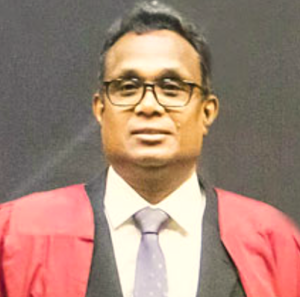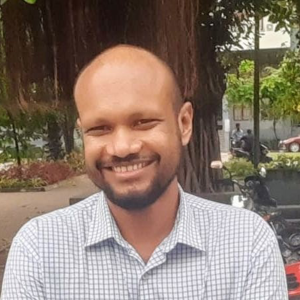
Welcome to the Centre for Mathematical Modelling (CM2)
The Centre for Mathematical Modelling (CMM), housed within the Department of Mathematics, Faculty of Science, University of Colombo, is a dedicated research and training hub established to foster the use of mathematical modelling in solving complex problems across scientific, industrial, environmental, and societal domains. The Centre leverages the academic strength and multidisciplinary environment of the university to support innovative research, knowledge dissemination, and collaboration in the field of mathematical modelling. It was established in 2012 under the pioneering guidance of Prof Sanjeewa Perera and Dr Jagath Wijerathna with the expectation of providing a vibrant platform for both established and budding young researchers to undertake multidisciplinary and interdisciplinary research activities through Mathematical Modelling.
Contact Details
Centre for Mathematical Modelling Department of Mathematics
University of Colombo
PO Box 1490
Colombo 00300
Sri Lanka
Phone:+94 11-2058231
Fax: +94 11-2058139
Director
Prof. Sanjeewa Perera
ssnp@maths.cmb.ac.lk
cmm@maths.cmb.ac.lk
Deputy Director
Prof. Anuradha Mahasinghe
anuradhamahasinghe@maths.cmb.ac.lk
Grants & Awards
Grants
- National Science Foundation Research Program on Health Science, June 2017 – June 2020, Project Title: Proactive Dengue Management System (ProDMS)
- DAAD Conference grant for International Conference on Computational Modeling and Simulation – 2017
- NSF Conference grant for International Conference on Computational Modeling and Simulation – 2017
Awards
- Dr. Sanjeewa Perera – NSF SUSRED Award (in recognition of the supervision of the PhD titled “Developing and validating a mathematical model to quantify air quality in Colombo”) – 2017
- Dr. Sanjeewa Perera – NSF SUSRED Award (in recognition of the supervision of the PhD titled “Developing a mathematical model to study dengue epidemics and controllability of transmission of dengue”) – 2017
- Dr. Sanjeewa Perera – NRC Merit Award for Scientific / Research Publications – 2010
- Dr. Sanjeewa Perera – SLAAS Postgraduate Research Award (Merit) – 2009
- Dr. Anuradha Mahasinghe – NRC merit award for scientific publications 2014
- Dr. Anuradha Mahasinghe – NRC merit award for scientific publications 2015
People
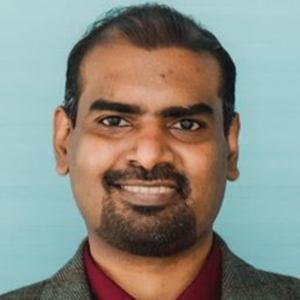
Dr. Prabath Liyanage
Deputy Director | Industrial Engagement and Leader | AI & Simulation Models
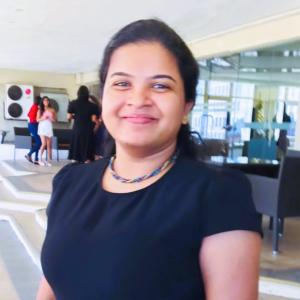
Dr. Hasitha Erandi
Deputy Director | International Collaboration
Vision
To be a leading centre in Sri Lanka and the South Asian region for research, education, and innovation in mathematical modelling, advancing scientific discovery and contributing to societal development through data-informed decision-making.
Mission
To promote the use and understanding of mathematical modelling through high-quality research, interdisciplinary collaboration, education, and community outreach, enabling informed decision-making and problem-solving across a wide range of domains.
Aim
The primary aim of the Centre is to explore, develop, and apply mathematical models that contribute to scientific progress, technological innovation, and evidence-based policymaking while nurturing a strong community of researchers and learners.
Objectives
- Research Excellence:
Conduct high-quality research in mathematical modelling,
systems analysis, and simulations. - Capacity Development:
Offer training programs, workshops, and research opportunities for
undergraduate and postgraduate students. - Interdisciplinary Collaboration:
Foster collaboration between mathematicians and experts in fields
such as biology, physics, engineering, economics, and social
sciences. - Application & Innovation:
Develop and apply mathematical models in areas of national and
global relevance. - Dissemination of Knowledge:
Share findings through publications, technical reports, public lectures, and digital platforms. - Resource Development:
Create a repository of modelling tools, software, and datasets for academic and public use.
Activity Plan
Research Projects:
Initiate and support collaborative research projects with national and
international partners, focusing on pressing societal challenges.Workshops & Seminars:
Conduct regular workshops, seminars, and conferences to foster
learning, discussion, and innovation in mathematical modelling.Training & Education:
Provide training sessions, short courses, and certificate programs for
students, teachers, researchers, and industry professionals.Consultancy & Outreach:
Offer consultancy services and expertise in mathematical modelling
for government agencies, NGOs, and industries.Student Engagement:
Encourage student involvement in research and problem-solving
through modelling competitions, internships, and final-year projects.Publication & Communication:
Publish research outputs in journals and maintain a digital platform for
sharing working papers, case studies, and modelling resources.Infrastructure & Tools:
Develop computational infrastructure and modelling software for
teaching and research purposes.
Models & Simulations
STOCHASTIC MODELLING
A Mathematical Model to Study Dynamics of Dengue Epidemics and Controllability of Transmission of Dengue in Colombo
Team : Dr. S. S. N. Perera, Dr. W. P. T. M. Wickramaarachchi
Dengue disease, which is a mosquito-borne disease, has been an important public health problem specially in the tropical and subtropical regions in the world. Neither vaccine nor successful treatment has been found yet to dengue disease. Therefore prevention and control play a vital role in minimizing the risk of dengue and its burden from the vulnerable populations. Mathematical models of dengue with xed parameters do not completely describe the dynamics of the dengue transmission since the dynamics of dengue depend on various external factors such as climate, human mobility, geography and demography. This project wavelet tool was used to analyze dengue data and identify the correlation between dengue and climate factors. Fuzzy based climate index was developed and which was incorporated into the classical SIR model.
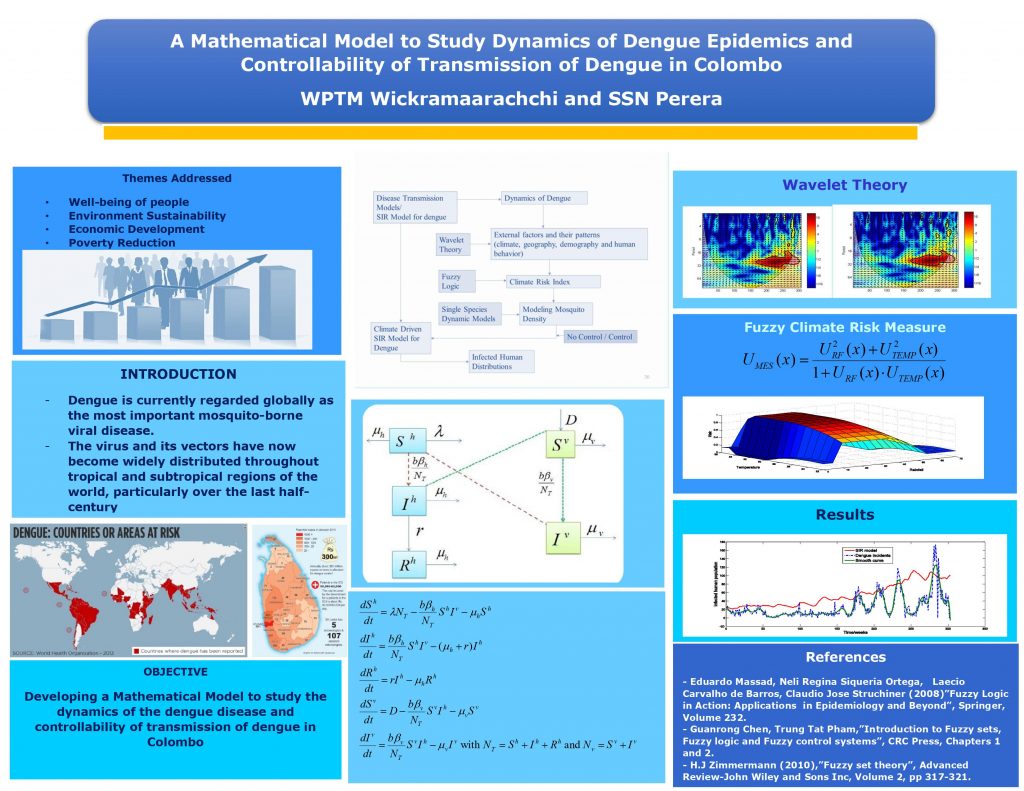
Developing & Validating a Mathematical Model to Quantify Air Quality in Colombo
Team : Dr. S. S. N. Perera, Dr. S. K. Boralugoda, Dr. Thilini Piyatilake
The air is a basic need of all life on planet earth. Unfortunately, the quality of air has fallen down and the main impact of polluted air on human is related to severe health hazards. This is a burning problem to the developing economy of countries like Sri Lanka. Urbanization and rapid development in these countries are the main reasons for air pollution. Therefore, it is important to identify the levels of the air pollution in cities in order to predetermine actions to improve the quality of air. There are lot of methods already available to measure the air quality, but these methods are based on direct measures of concentration of pollutants. The concentration cannot be measured continuously in countries like Sri Lanka by using direct measures due to lack of resources and financial support. Therefore, quantifying the levels of air pollution in cities using indirect technique is found practical.
The objective of this study is to develop a mathematical model to quantify air pollution using indirect measurements. Five most significant factors such as industries, population density, traffic intensity, green coverage and weather conditions are considered. The boundaries of the factors cannot be well defined. Therefore, fuzzy set theory is applied. Membership functions are defined for all the factors and those factors are combined using fuzzy operators. MATLAB program is used for the simulations. In order to construct and to validate the mathematical model, twenty three major cities in the world are considered. Then, the ranks of cities are compared with the PM2:5 concentration levels. Finally, a case study is carried out by selecting Colombo Municipal Council region in Sri Lanka.
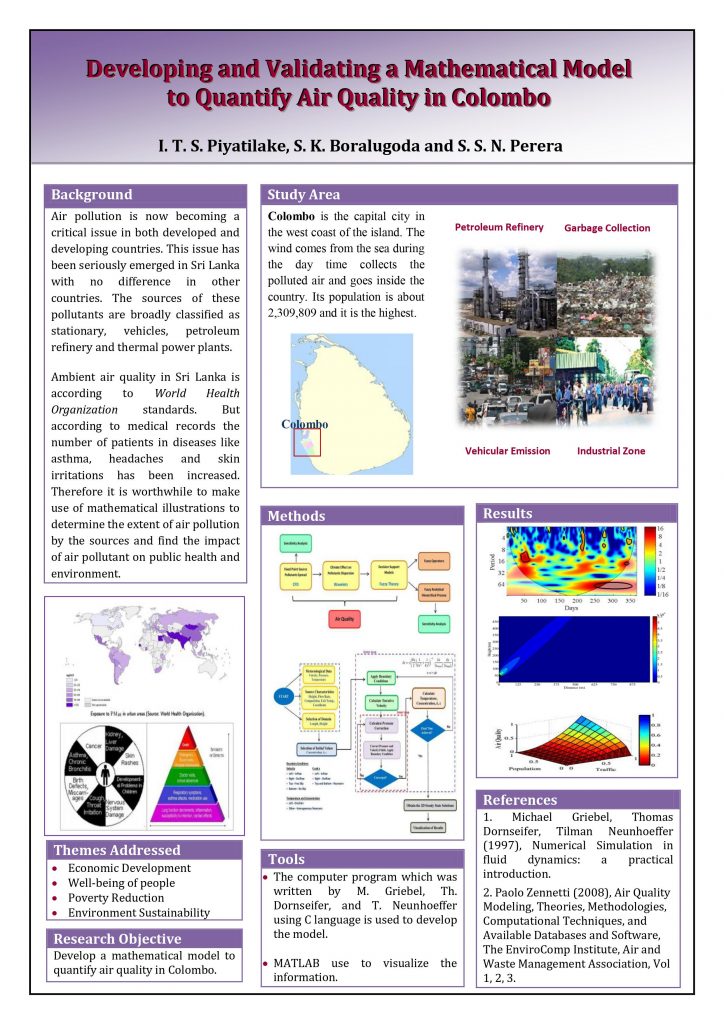
Development of a Mathematical Model to evaluate the risk of deliberate introduction of Plant species to Sri Lanka
Team : Dr. S. S. N. Perera, Prof. S. Chakraverty, Prof. S. M. W. Ranwala, Ms. H. O. W. Peiris
The purpose of this study is to develop a mathematical model for risk assessment that evaluates the invasion risk of invasive alien plant species based on their biological attributes. Data for most of the attributes were qualitative and in the form of linguistic terms. In order to handle the numerical and linguistic variables, we proposed three models in the fuzzy environment. In the first model, all the selected attributes were considered as equally important to invasiveness and in the second and third models, these are considered to be unequally important. The important weights for the biological attributes in these models were gathered from the group of experts in plant sciences. Proposed Model III incorporates more sophisticated linguistic tool than Model II. Model II gives better predictions in comparison to the first and third models and it is found to be better tracking system for identifying potential invaders as in the case of conventional risk assessment method.
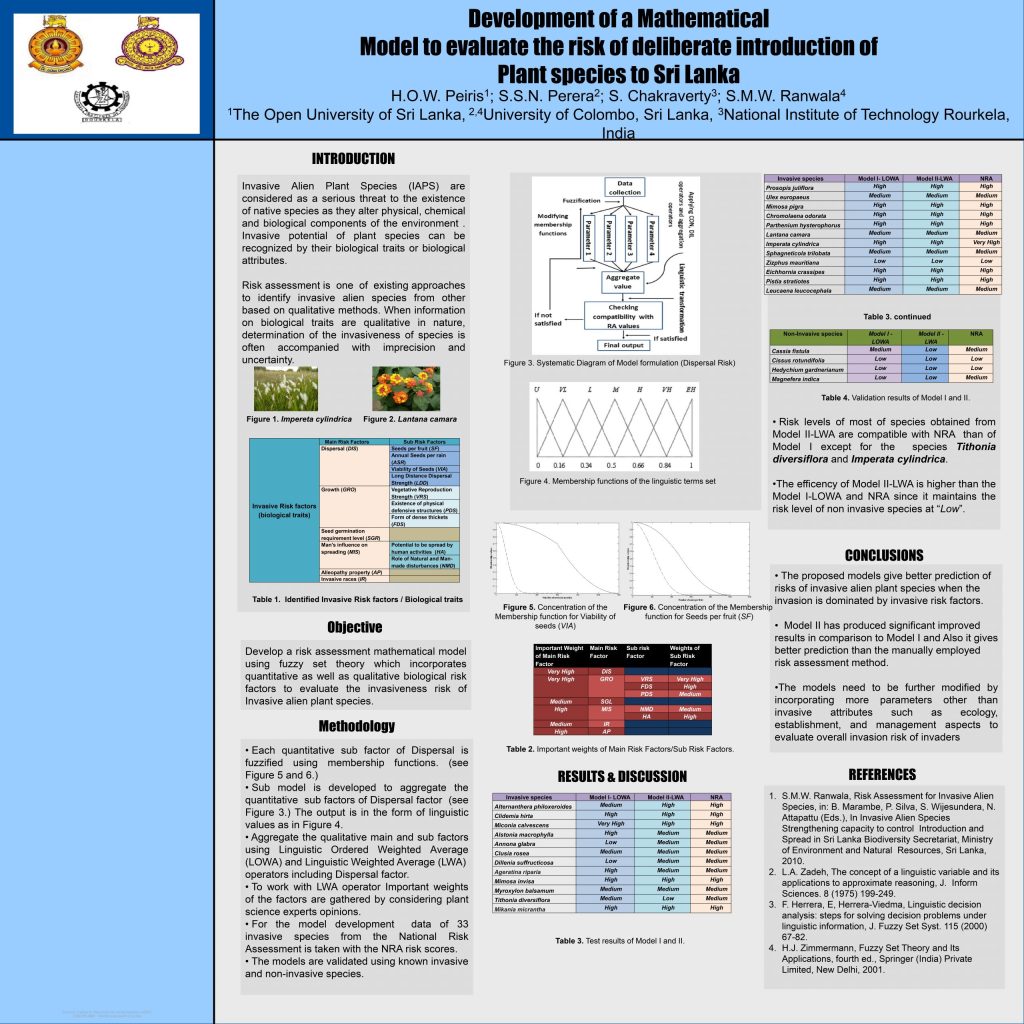
Team : Dr. S. S. N. Perera, Dr. W. P. T. M. Wickramaarachchi
Dynamical Systems
Dengue: Mathematical Modelling of Cytokine Levels in the Evolution of Severity
Team : Dr. S. S. N. Perera, Dr. P. Jayasundara, Prof. G. Malavige, Prof. S. Jayasinghe
Background: Dengue causes considerable morbidity and mortality in Sri Lanka. Immune mediated and cytokine related factors contribute to its evolution from an asymptotic infection to severe forms of dengue. Previous studies have analysed the association of individual cytokines with clinical disease severity. In contrast, we have viewed this evolution to severe dengue as the behaviour of a complex dynamic system. We therefore analysed the combined effect of multiple cytokines that interact dynamically with each other in order to generate a mathematical model to predict the occurrence of severe dengue. We expect this to have predictive value in detecting severe cases and improve outcomes. Methods & Materials: We analysed data on 11 adult patients with dengue fever (DF) and 25 patients with dengue haemorrhagic fever (DHF) recruited from the Colombo South Teaching Hospital, Sri Lanka. Platelet activating factor (PAF), sphingosine 1-phosphatase (S1P), IL1, TNF and IL10 were used as the cytokine parameters for the model. Hierarchical clustering was used to detect factors that correlated with each other. Their interactions were mapped using Fuzzy Logic mechanisms with the combination of Hamacher and OWA operators. Results: Clustering indicated that S1P and IL1 levels were associated with each other. Since, PAF, IL-10 and TNF-have shown to associate with severe dengue, they were combined together by allocating these cytokines a higher prominence in the model. Operator value below 0.3 in the overall model correctly predicted development of DHF with 76.6% accuracy.
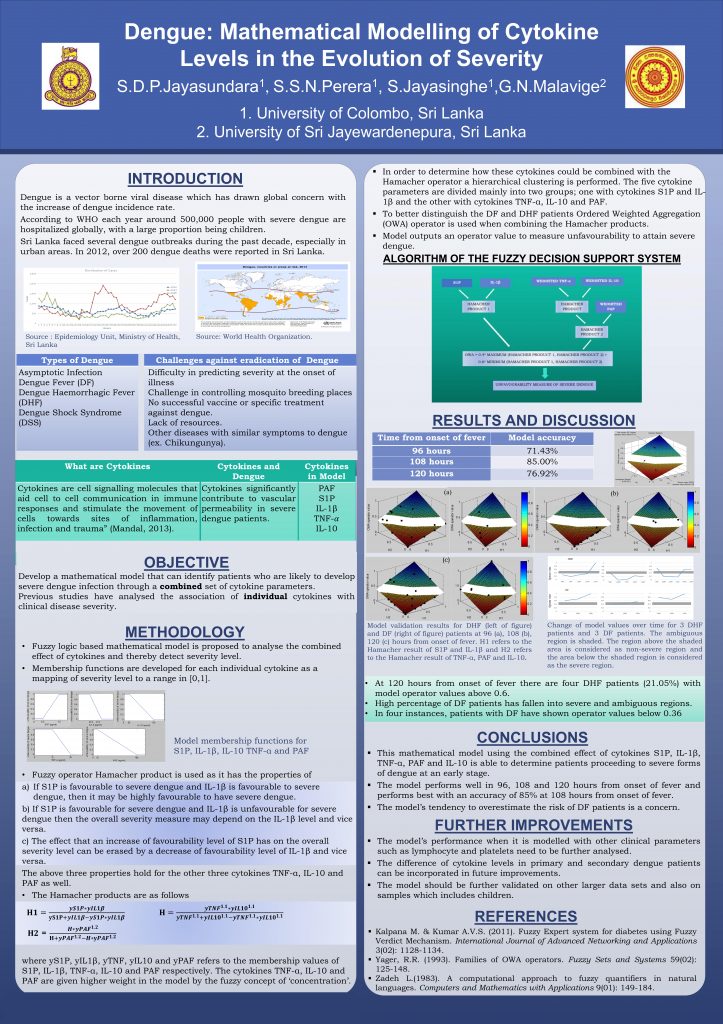
Mathematical Modelling of Immune Parameters in the Evolution of Severe Dengue
Team : Dr. S. S. N. Perera, Prof. G. N. Malavige, Prof. S. Jayasinghe, Dr. M. K. Premaratne
Aims: Predicting the risk of severity at an early stage in an individual patient will be invaluable in preventing morbidity and mortality caused by dengue. We hypothesized that such predictions are possible by analyzing multiple parameters using mathematical modeling. Methodology. Data from 11 adult patients with dengue fever (DF) and 25 patients with dengue hemorrhagic fever (DHF) were analyzed. Multivariate statistical analysis was performed to study the characteristics and interactions of parameters using dengue NS1 antigen levels, dengue IgG antibody levels, platelet counts, and lymphocyte counts. Fuzzy logic fundamentals were used to map the risk of developing severe forms of dengue. The cumulative effects of the parameters were incorporated using the Hamacher and the OWA operators. Results. The operator classified the patients according to the severity level during the time period of 96 hours to 120 hours after the onset of fever. The accuracy ranged from 53% to 89%. Conclusion. The results show a robust mathematical model that explains the evolution from dengue to its serious forms in individual patients. The model allows prediction of severe cases of dengue which could be useful for optimal management of patients during a dengue outbreak. Further analysis of the model may also deepen our understanding of the pathways towards severe illness.
Mathematical Modeling for dynamics of dengue virus - A system approach
Team : Dr. S. S. N. Perera, Ms. Sulanie Perera
Dengue is a globally important vector-borne virus that causes a spectrum of diseases. There is an urgent need for a drug or vaccine against dengue, yet none are presently available.
Multiple factors have hindered the development of a successful vaccine. One such factor has been the poor understanding of the immune mechanism that is driving virus control during an infection.
In this context, it is important to understand the biological mechanism that is involved during an infection. Mathematical modeling of the underlying biological interactions has proven to be a powerful tool in the understanding of viral kinetics and disease outcomes.
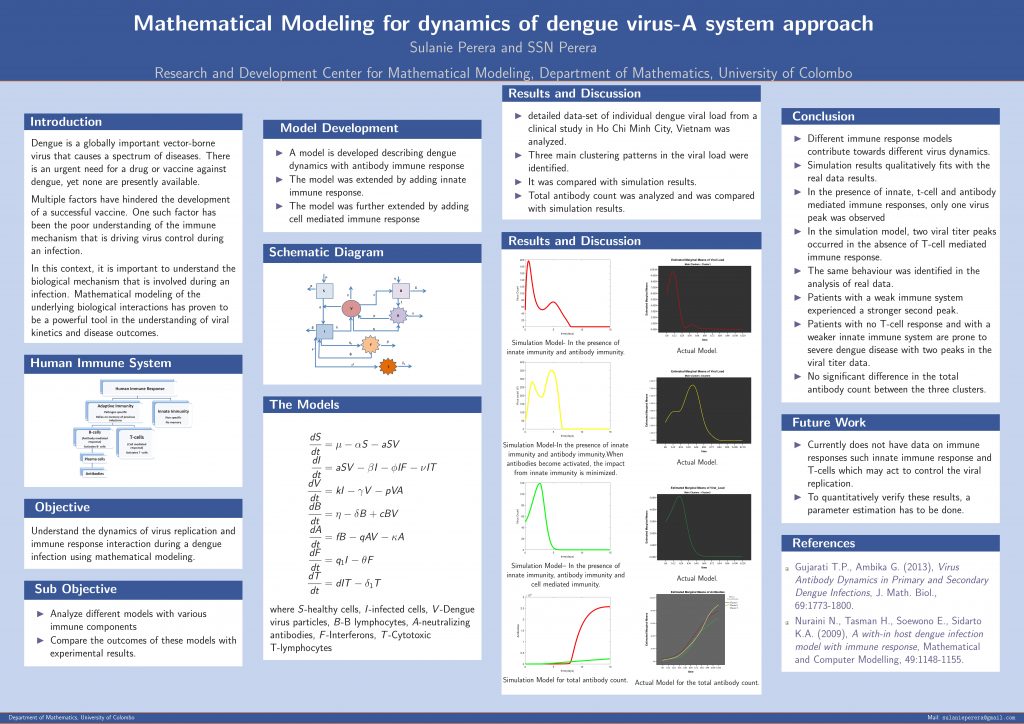
Artificial Inteligence

Quantum Computing

Recreational Mathematics

National-Level Projects

International Conferences
INTERNATIONAL CONFERENCE ON COMPUTATIONAL AND MATHEMATICAL MODELLING 2025
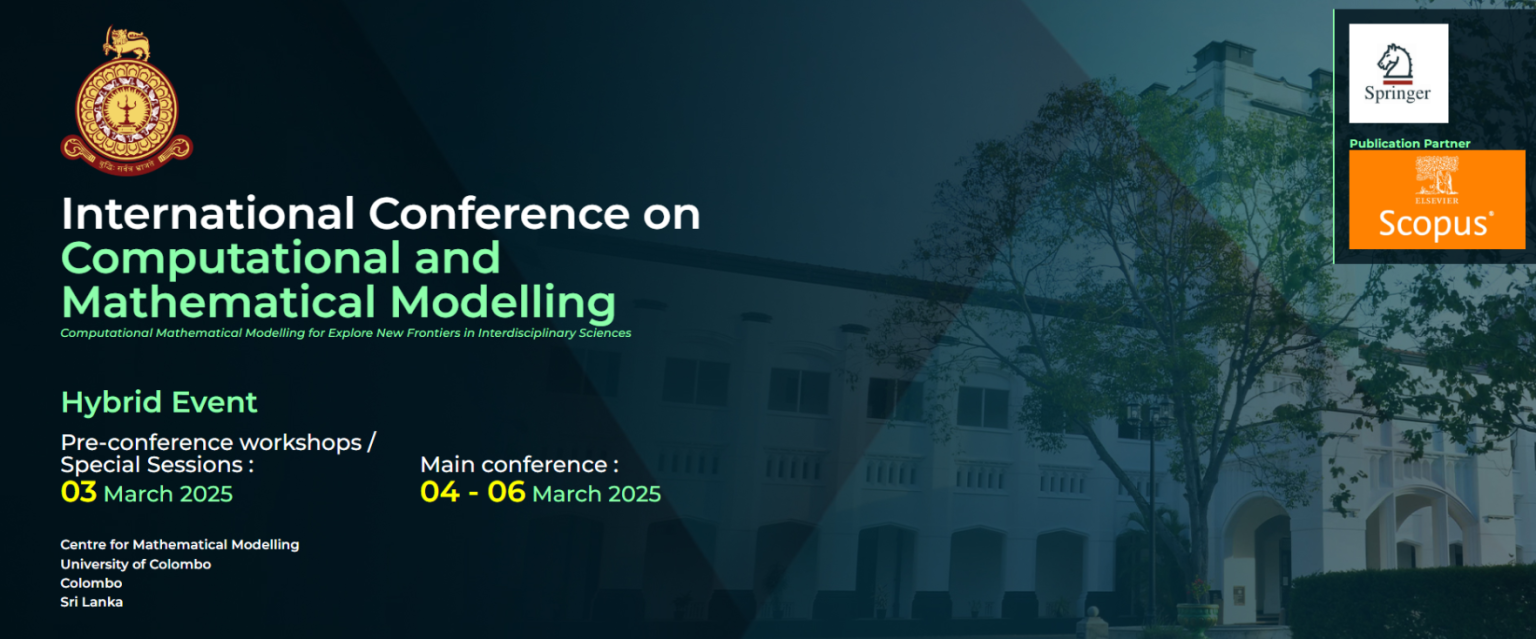
The International Conference on Computational and Mathematical Modelling (ICCMM 2025), organised by the Centre for Mathematical Modelling, served as a dynamic platform for international scholars to exchange ideas and present research spanning the broad spectrum of computational and mathematical modelling.
Building on the success of ICCMM 2024, this year’s conference continued to foster collaboration and promote original, cutting-edge contributions in all areas of applied mathematics. Abstract submissions underwent an internal peer review process, and accepted abstracts were included in the Proceedings of ICCMM 2025. Selected extended papers, based on reviewer evaluations, were considered for publication in Springer Studies in Autonomic, Data-driven and Industrial Computing or other relevant journals.
ICCMM 2025 gave priority to original research while also welcoming high-quality survey papers that addressed emerging trends and technologies in the field. The conference further strengthened the Centre’s role in advancing mathematical and computational modelling within Sri Lanka and across the global academic community.
By drawing contributions from leading researchers worldwide, ICCMM 2025 supported the Centre’s ongoing mission to integrate state-of-the-art techniques into research, nurture interdisciplinary collaboration, and apply mathematical modelling to real-world challenges through data-informed, innovative approaches.
Explore ICCMM 2025 ( link to https://iccmm.cmb.ac.lk/2025/)
iNTERNATIONAL CONFERENCE ON COMPUTATIONAL AND MATHEMATICAL MODELLING 2024
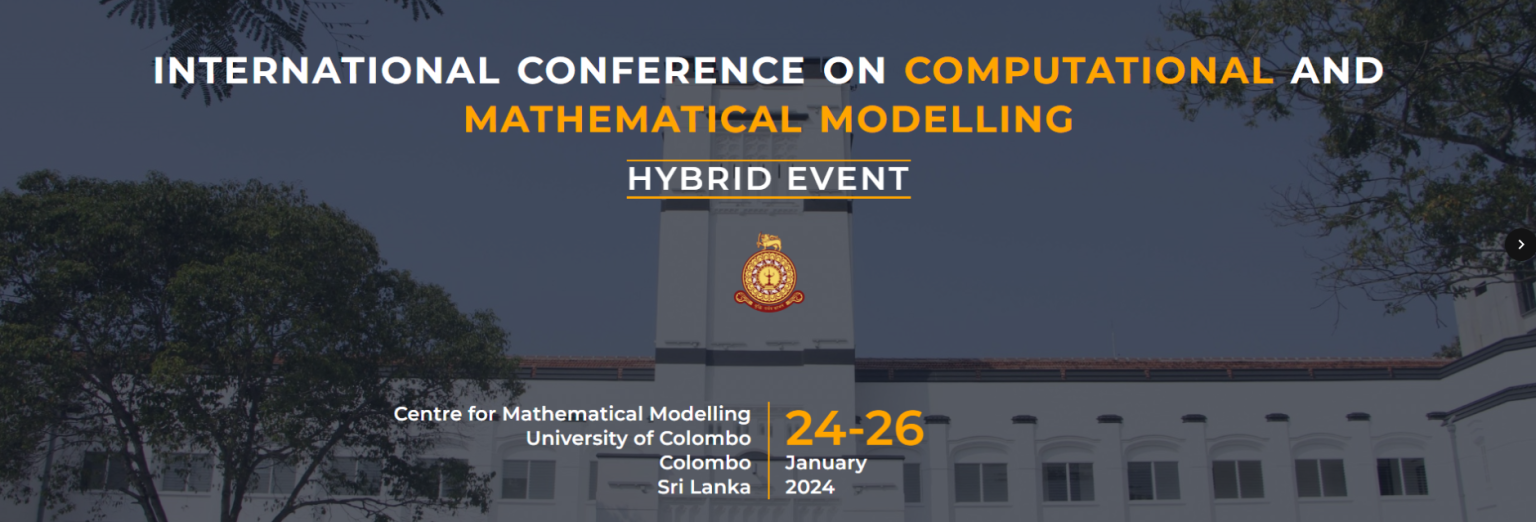
The International Conference on Computational and Mathematical Modelling (ICCMM 2024), hosted by the Centre for Mathematical Modelling, convened scholars from across the globe to exchange ideas and present original research in the broad field of mathematical and computational modelling.
Focusing on three main tracks — Mathematical Modelling, Scientific Computing and Simulation, and Computational Models and Discrete Applied Mathematics — the conference upheld rigorous academic standards through a thorough peer review process, with accepted papers published in the Proceedings of ICCMM 2024.
ICCMM 2024 directly supported the Centre’s mission to promote high-quality, interdisciplinary research and to apply mathematical modelling in ways that inform policy, advance science, and foster innovation across sectors.
Explore ICCMM 2024 ( link to https://iccmm.cmb.ac.lk/)
INTERNATIONAL CONFERENCE ON MATHEMATICAL MODELLING 2014
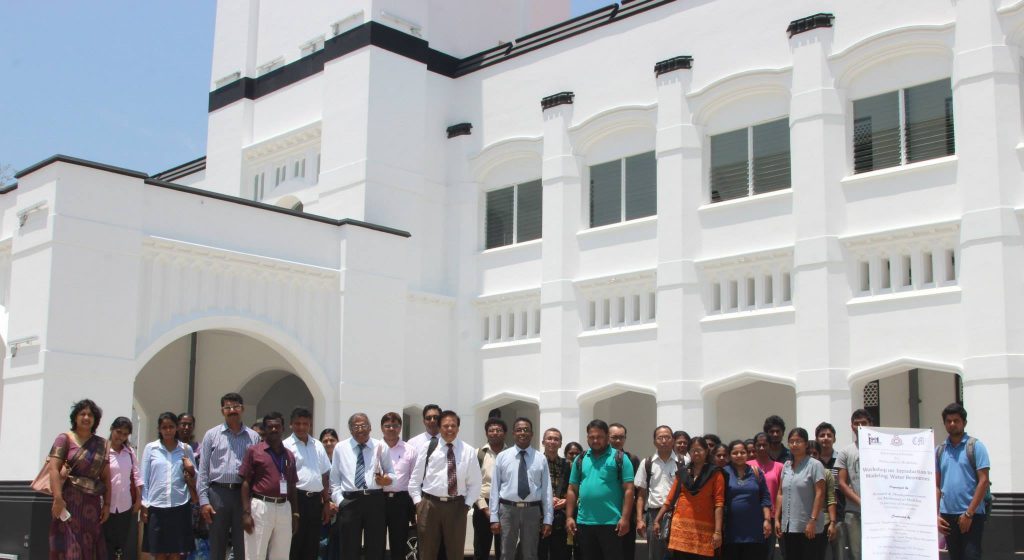
The International Forum for Mathematical Modelling, organised by the Research & Development Centre for Mathematical Modelling, Department of Mathematics of the University of Colombo, was held from 10th to 21st March 2014. It was held in partnership with DAAD, Technische Universität Kaiserslautern, University of Kathmandu, Bandung Institute of Technology and HETC. The forum consisted of a number of workshops conducted by academics from the partnering universities, and local experts also participated in this forum to make it a success.
Special Sessions
THE INTERNATIONAL CONFERENCE ON COMPUTATIONAL MODELLING & SIMULATION 2017
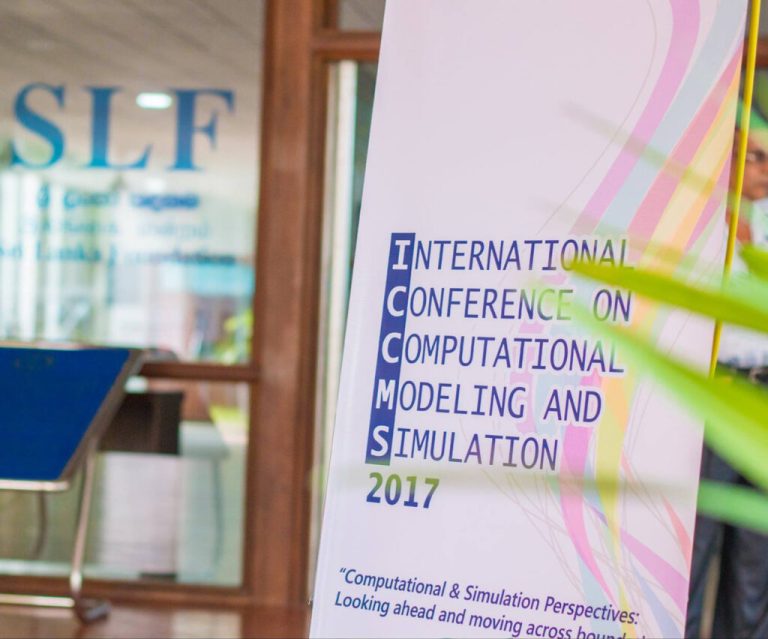
ICCMS-2017 is organised by the Faculty of Science, University of Colombo, Sri Lanka in collaboration with the Department of Mathematics of South Asian University, Delhi, India, and the Faculty of Mathematics and Natural Sciences, Institute of Technology, Bandung, Indonesia. The conference provides a platform to discuss and share knowledge on Computational Modelling and Simulation across many disciplines.
Special sessions conducted by the centre
- Special Session on Health and Biological Modelling
The Research & Development Centre for Mathematical Modeling, Faculty of Science, University of Colombo organized a special session on Modeling and Simulation in Health and Biological Modeling in collaboration with the Department of Clinical Medicine, Department of Community Medicine, Faculty of Medicine, University of Colombo and Centre for Dengue Research, Faculty of Medicine, University Sri Jayewardenepura.
The session enabled researchers from diverse fields and policymakers to share and learn about three key challenges facing Sri Lanka, the developing countries and also that have an impact globally.
- Special Session on Urban Health, Climate and Environment Modelling
The Research & Development Centre for Mathematical Modeling, Faculty of Science, University of Colombo organized a special session on Modeling and Simulation in Urban Health, Climate and Environment in collaboration with the Department of Clinical Medicine, Department of Community Medicine, Faculty of Medicine, University of Colombo and Department of Architecture, University of Moratuwa.
- Special Session on Quantum Computation and Quantum Information
Quantum computation adopts an entirely different approach than classical computation, and its capability of implementing superfast algorithms has been proved both theoretically and experimentally. A significant number of researchers are currently involved with research on quantum computation and quantum information. Thus, the conference allocated a special session for this particular area, as there is a high possibility that quantum computation might be the computational paradigm of the future. The session provided a platform for experts and novices to meet together and share the results.
- Special Session on Mathematical Modelling and their Industrial Applications
In the modern world, the Mathematical Modelling concept is being used in various industries as a cost-effective experimental tool. This special session provided a unique platform to exchange and share knowledge and experiences of Mathematical Modelling in various industries.
SESSION ON QUANTUM COMPUTATION IN ICCMS 2017
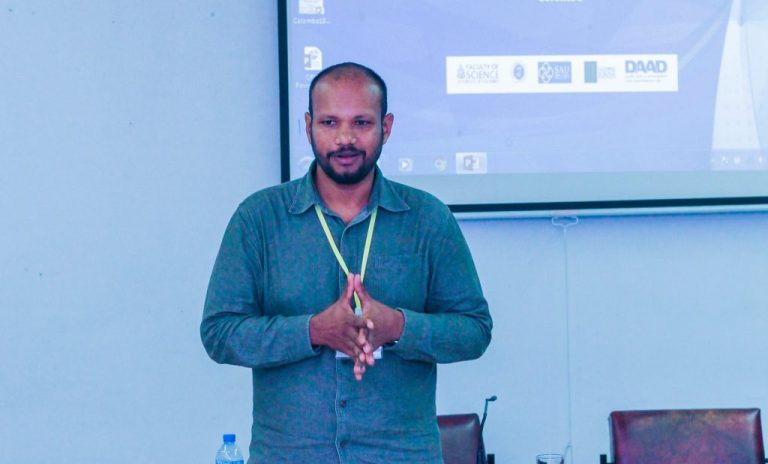
Many real-life problems can be modelled mathematically and solved efficiently by sophisticated quantum technologies. A special session on these quantum technologies was organised by the individuals associated with the centre in 2017.
This Special Session on Quantum Computation & Quantum Information was organised during the International Conference on Computational Modelling & Simulation (ICCMS 2017)
Dates: 17th & 18th of May 2017
Linking Industry and Academia (7th March 2019)
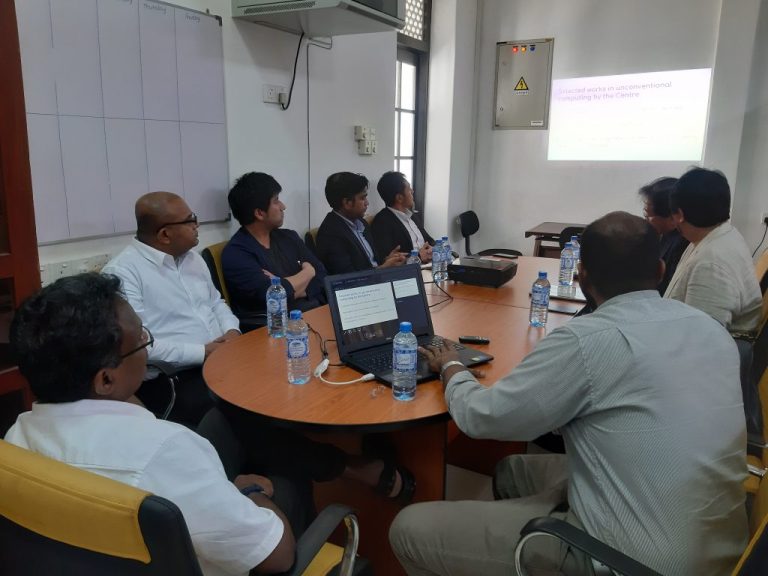
The centre welcomes industrial partners looking for tentative interns from Financial Mathematics and IT Major streams, and is always looking forward to strengthening the links with industry.
A meeting was held on the 7th of March 2019 with potential local and foreign industrial partners, including members from the Japan Deep Learning Association, who expressed their willingness to have interns reading for mathematical sciences.
ICMAS 2021 THE INTERNATIONAL CONFERENCE ON MULTIDISCIPLINARY APPROACHES IN SCIENCE
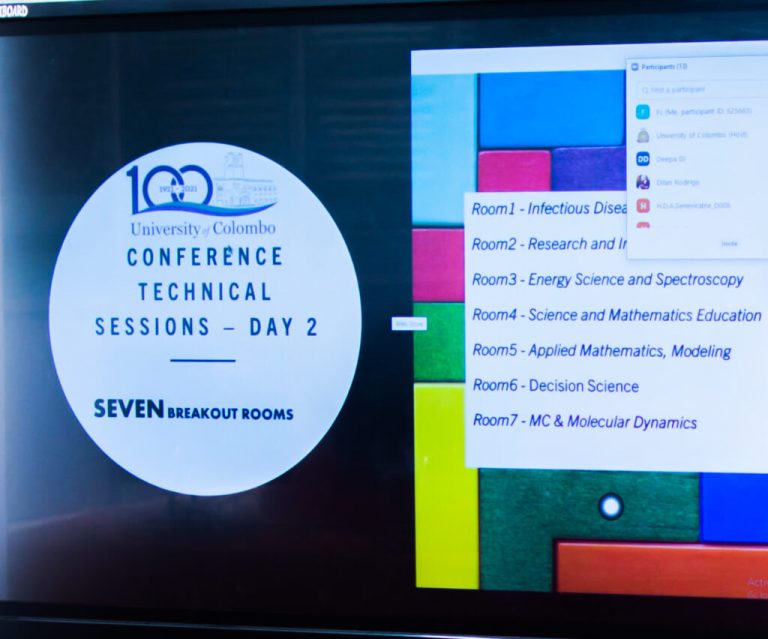
The inauguration of ICMAS, the International Conference on Multidisciplinary Approaches in Science, was held on the 24th of November 2021 at the Information & Learning Centre, Faculty of Science, University of Colombo, from 8.30 am onwards. ICMAS targets to update the recent developments of knowledge and practices in basic sciences and to enhance and promote multidisciplinary research as a tool to overcome challenges in the coming decade and beyond.
Special sessions conducted by the centre
- Mini-Symposium: Special Session on Quantum Computing
Quantum computers have provided promising solutions to several hard mathematical problems, which are intractable on even the most powerful classical computers. Being ahighly cross-disciplinary field, quantum computing has drawn the attention of mathematicians, physicists, computer scientists and engineers.
The objectives of the special session on quantum computing in ICMAS 2021 are two-fold. It provides a platform for quantum computing researchers to share their recent results. Meanwhile, it is aimed at educating and facilitating enthusiasts with the fundamentals and primary experience of using quantum computing platforms.
Organiser: The Research and Development Centre for Mathematics Modelling in collaboration with the Faculty of Science, University of Colombo, Sri Lanka.
- International Symposium on Applied Mathematics, Modelling, Analysis and Simulations
The Research & Development Centre for Mathematical Modelling and the Faculty of Science, University of Colombo, Sri Lanka, in collaboration with the South Asian University, New Delhi, India, organised an International Symposium on Applied Mathematics, Modelling, Analysis and Simulations.
- Symposium on Infectious Diseases Modelling
The Research & Development Centre for Mathematical Modelling, in collaboration with the Faculty of Science, is organising a Symposium on Infectious Diseases Modelling.
Symposium on Infectious Diseases Modelling aimed to bring together academics,researchers and young research scholars to exchange and share their knowledge and experiences on all aspects of Infectious Diseases Modelling. This also provided a multidisciplinary platform for academics/researchers/professionals to present recent model developments as well as challenges encountered and possible solutions in the area of Infectious Diseases Modelling.
Workshops
Mini-workshop on Introduction to Research 2023
- Introduction
On the 2nd of June 2023, the Centre for Mathematical Modelling conducted a mini-workshop on ‘Introduction to Research’ for the students who are intending to research on the application of mathematics at the Department. Final-year undergraduates from Applied Mathematics (AM), Computational Mathematics (CM), Mathematical Finance (MF), and also Finance Insurance (FI) degree programs participated in the event.
- Workshop Proceedings
2.1 Presentation on Research in Applications of Mathematics
The workshop started at 12.30 pm and Dr. Anuradha Mahasinghe initiated the session by delivering a presentation on introduction to research in applications of mathematics. Making a distinction between research in mathematics and applications of mathematics, he explained that the domain of the latter is mostly in the field of scientific research, in which the inductive-deductive approach is the standard, in contrast to the mostly deductive approach in earlier. That being said, the inadequacy of inductivist approaches in mathematics were shown with examples, and it was strongly recommended to have a significant deductive component in the research work the students are intending to do. For instance, when models are fitted to datasets, the importance of a deductive approach – a thorough investigation of the assumptions for the model to be applicable was explained. The presentation continued by explaining how to start a research work by referring to literature from good repositories, and also with tips for good oral presentations. The importance of avoiding predatory publications in a literature survey was also emphasised.
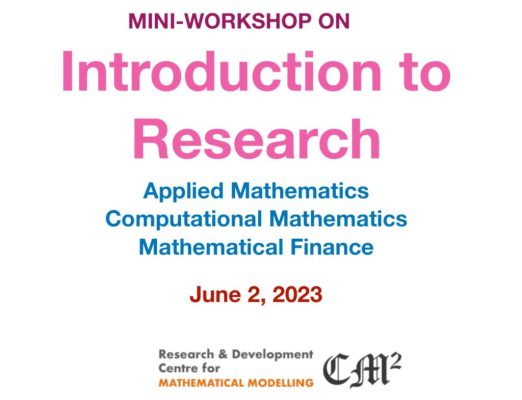
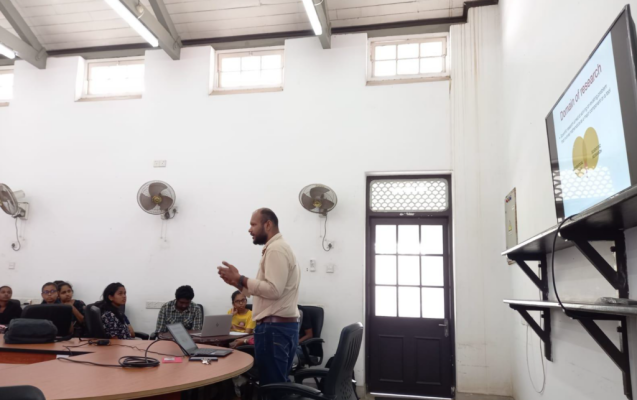
2.2 Presentation by Former Research Students
After the first presentation, the workshop continued with another presentation by two former students, Ms. Dulmi Fernando and Ms. Chami Kariyapperuma who shared their research experiences in the last year with the participants. They discussed their experience, highlighting the challenges they encountered and showing their research outcomes.
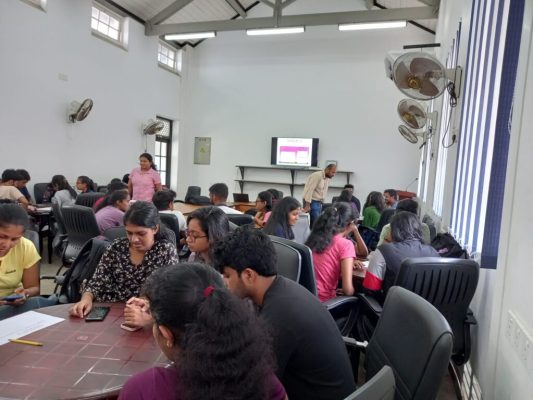
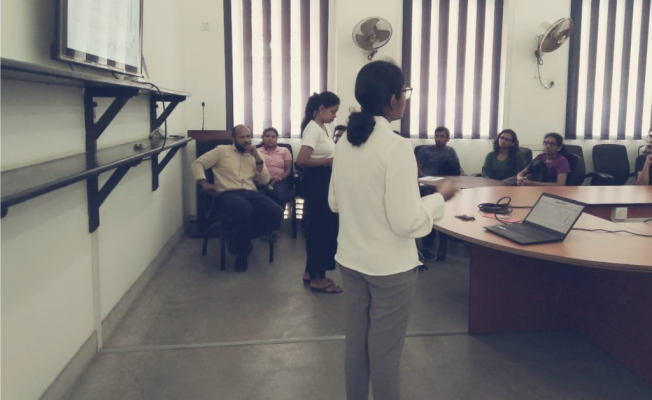
2.3 Group Activity
Following the two presentations, the participants engaged in a group activity designed to apply what they learned during the workshop. They were divided into seven groups, and each group was assigned a question to explore during the workshop. The objective of the group work was to facilitate meaningful interactions and knowledge sharing among the participants.
The following were the activities given to groups:
Group 1: Given a topic, finding 5 references and rating them by 1 to 5 stars, according to relevance to the topic and credibility of the source, so that each rating 1 to 5 appears somewhere in the list.
Group 2: Commenting on a summary of a research report
Group 3: Commenting on a slide from a ppt-aided presentation
Group 4: Given a list of references on a particular topic, selecting the least-significant one
Group 5: Given a list of topics, selecting the ones that are suitable as undergraduate research projects
Group 6 (FI students): Finding what is patentable and what is not in industry-based research
Group 7 (FI students): Making a list of good venues to look for industrial white papers
Once the activity was over, each group presented their findings, allowing for further interactions and learning from different aspects. Following each group presentation, Dr. Anuradha Mahasinghe, Dr. Hasitha Erandi, and the participants engaged in discussions, offering comments and feedback.
Discrete Modelling with Binaria (28th March 2019)
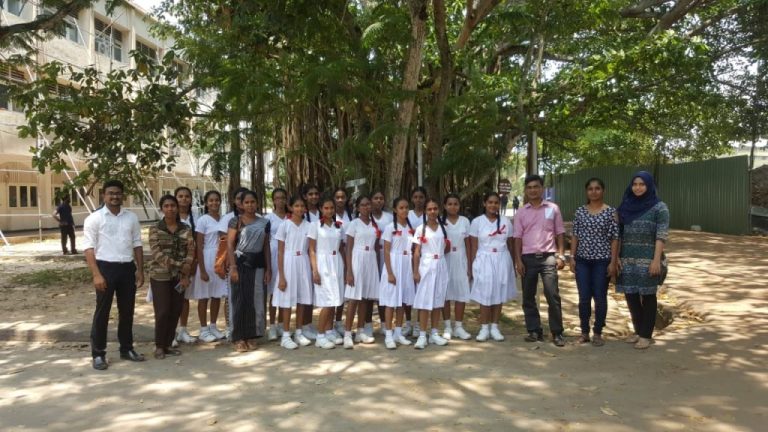
Binaria is an exhibition particularly designed by the centre to popularise mathematics and mathematical modelling among school children. Several discrete models in nature and society can be found among its exhibits. (For more details, click here.)
For teachers
Interested in installing Binaria in your exhibition?
Send a request, and we are happy to conduct training sessions and provide you with the exhibits.
The centre conducted a training session on the 28th of March 2019, for the students of Sri Jayewardenepura Kotte Balika Vidyalaya on how to run the ‘Binaria’ exhibition stall at the annual exhibition held on the 4th & 5th of April 2019 in the school premises.
Workshop on Financial Modelling 2014
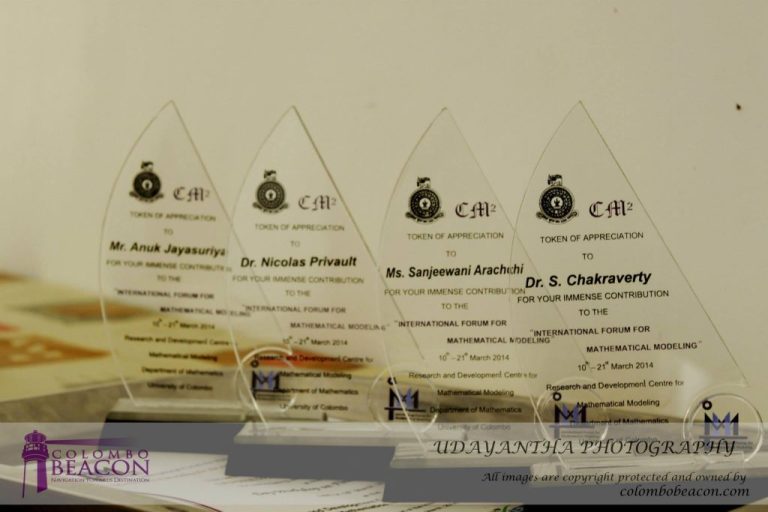
The workshop on financial modelling took place on 18th March 2014. The purpose of this workshop was to enhance collaboration between practitioners from industry and academics in the field of financial modelling. The speakers were invited from industry as well as academia to come and discuss their current research interests and industrial problems. The workshop was able to address the interests of amateurs as well as experts in financial modelling.

